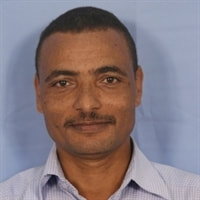
On the 13th of September 2017, Mohammed Hassena Beko defended his thesis: Seed for Change. The making and implementation of seed policies in Ethiopia. The PhD was supervised by me as promotor and Otto Hospes, Bram de Jonge and Niels Louwaars as co-promotors.
The Ethiopian seed policy is intended to ensure that farmers get the right seed, at the right place and at the right time, in order to alleviate food insecurity at different levels in the country. However, so far the seed policy has not been very successful. This necessitated the government to review its policy. Traditionally, Ethiopia uses a top-down and state-centred approach, not giving much room for bottom-up thinking and active involvement of stakeholders in policy processes. The government revised existing seed law, and different policy actors have participated in the process. Moreover, different efforts are underway to implement the policies to overcome the food security problems.
The objective of this research is twofold: to unravel the policy process and to assess the potential of collaborative seed sector governance. Considering policy as a process, this research investigates the process of seed policy implementation; how different actors have influenced the making of the new laws; and assess the potential of collaborative governance systems to manage changes in the seed sector. These are meant to create a better seed sector that can contribute to food security in Ethiopia. To investigate the policy making, theories on discourse analysis, round model and policy arena are used. To assess the policy implementation process, theories on multi-level perspectives on transition, transition management, non-decision making and institutional lock-in are used.
The defence can be seen here.
The Ethiopian seed policy is intended to ensure that farmers get the right seed, at the right place and at the right time, in order to alleviate food insecurity at different levels in the country. However, so far the seed policy has not been very successful. This necessitated the government to review its policy. Traditionally, Ethiopia uses a top-down and state-centred approach, not giving much room for bottom-up thinking and active involvement of stakeholders in policy processes. The government revised existing seed law, and different policy actors have participated in the process. Moreover, different efforts are underway to implement the policies to overcome the food security problems.
The objective of this research is twofold: to unravel the policy process and to assess the potential of collaborative seed sector governance. Considering policy as a process, this research investigates the process of seed policy implementation; how different actors have influenced the making of the new laws; and assess the potential of collaborative governance systems to manage changes in the seed sector. These are meant to create a better seed sector that can contribute to food security in Ethiopia. To investigate the policy making, theories on discourse analysis, round model and policy arena are used. To assess the policy implementation process, theories on multi-level perspectives on transition, transition management, non-decision making and institutional lock-in are used.
The defence can be seen here.